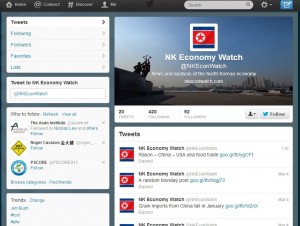UPDATE 6 (2013-3-11): Here is the DPRK Ministry of Foreign Affairs response to the UNSC Resolution 2094. As you can imagine, they do not approve.
UPDATE 5 (2013-3-8): The full official resolution can be read here. Here is the DPRK response to 2094. Here is some information on the Chinese response. Here is some more analysis/commentary from Scott Snyder in The Diplomat. Choson Ilbo reports that large North Korean bank accounts exempt from sanctions.
UPDATE 4 (2013-3-7): The resolution has passed 15-0. Read more at the BBC, Washington Post, New York Times. Marcus Noland commentary here and here. Victor Cha here. NK Leadership Watch has more on the events in Pyongyang…
UPDATE 3 (2013-3-7): Once made public, the resolution will be posted here. Steve Herman (via Adam Cathcart) tweeted a link to the draft resolution which has been uploaded to Scribed. It is dated yesterday (2013-3-6).
UPDATE 2 (2012-3-7): Here is a Press Release from the US mission to the UNSC that went out this morning on the new sanctions (Resolution 2094). Thanks to Aidan Foster-Carter.
For reasons of brevity, I have put the entire document into this PDF for download.
UPDATE 1 (2013-3-7): Yonhap offers details on the unpublished sanctions proposal put forth by the US and China:
The three North Korean arms dealers are: Yon Chong-nam, the chief representative for the Korea Mining Developing Trading Corp (KOMID); Ko Chol-chae, the deputy chief representative for the KOMID; and Mun Chong-chol, an official at Tanchon Central Bank, the resolution showed.
KOMID is described by the resolution as North Korea’s “primary arms dealer and main exporter of goods and equipment related to ballistic missiles and conventional weapons,” while the North Korean bank is the “main DPRK (North Korea) financial entity for sales of conventional arms, ballistic missiles, and goods related to the assembly and manufacturing of such weapons.”
The two North Korean entities are the Second Academy of Natural Sciences, which is responsible for research and development of the North’s advanced weapons systems, including “missiles and probably nuclear weapons,” and the Korea Complex Equipment Import Corp. linked to the North’s “military-related sales,” according to the draft.
The Security Council is set to vote on the draft resolution on Thursday in New York.
The new sanctions will also focus on the DPRKs shipping, air, and “financial” industries:
The Security Council “decides that all states shall inspect all cargo within or transiting through their territory that has originated in the DPRK, or that is destined for the DPRK,” the draft said.
It also “calls upon states to deny permission to any aircraft to take off from, land in or overfly their territory, if they have information that provides reasonable grounds to believe that the aircraft contains items” banned by previous U.N. resolutions, the document said.
It also makes it difficult for North Korea to move in and out “bulk cash,” in an effort to squeeze the North Korean elite’s access to hard currency.
The Security Council also calls on all states to “exercise enhanced vigilance over DPRK diplomatic personnel so as to prevent such individuals from contributing to the DPRK’s nuclear or ballistic missile programs,” it said.
The U.N.’s powerful body “expresses its determination to take further significant measures in the event of a further DPRK launch or nuclear test,” the draft warned.
The DPRK’s Uranium enrichment program also gets a mention:
Apparently mindful of the North’s uranium concerns, the draft resolution includes Pyongyang’s uranium enrichment program for the first time, condemning “all the DPRK’s ongoing nuclear activities, including its “uranium enrichment.”
The North claims its uranium enrichment program is for peaceful energy development, but outside experts believe that it would give the country a new source of fission material to make atomic bombs, in addition to its widely known plutonium-based nuclear weapons program.
The DPRK, has of course, issued a response
In response to the proposed U.N. sanctions and ongoing Seoul-Washington joint military drills, the North’s military threatened to scrap the Korean War cease-fire.
Kim Yong-chol, a hard-line North Korean general suspected of involvement in a series of provocations against the South, read the statement on state TV, saying the North “will completely declare invalid” the Armistice Agreement that ended the 1950-53 Korean War.
The North also said it will cut off a military phone line at the truce village of Panmunjom.
South Korea’s military responded to the North’s bellicose threats with a verbal salvo, warning it would strike back at the North and destroy its “command leadership,” if provoked by Pyongyang.
ORIGINAL POST (2013-3-5): According to the New York Times:
The United Nations Security Council moved closer on Tuesday to expanding sanctions on North Korea for its nuclear and ballistic missile activities. The United States and China introduced a resolution that would target North Korean bankers and overseas cash couriers, tighten inspections of suspect ship and air cargo, and subject the country’s diplomats to invasive scrutiny and increased risk of expulsion.
Passage of the measure, drafted in response to the third North Korean underground nuclear test three weeks ago, seemed all but assured, in part because China — North Korea’s major benefactor — participated in drafting the language. It would be the fourth Security Council sanctions resolution on North Korea, which has defied the previous measures with increasing belligerence. A vote was expected on Thursday.
Infuriated, North Korea vowed to scrap the 1953 armistice that halted the Korean War and threatened to attack the United States with what the North Korean government news agency called an arsenal of diverse “lighter and smaller nukes.”
American officials played down the North Korean warning, which echoed bombastic admonitions that have become part of the standard fare from the North. Still, the threat of a North Korean nuclear attack seemed all the more provocative, coming two days after North Korea conveyed a message of friendship to a visiting American group that included Dennis Rodman, the former basketball star.
Susan E. Rice, the United States ambassador to the United Nations, who introduced the resolution in a closed session of the 15-member Security Council, told reporters afterward that it “builds upon, strengthens and significantly expands the scope of the strong U.N. sanctions already in place.”
For the first time, she said, the resolution would target “the illicit activities of North Korean diplomatic personnel, North Korean banking relationships, illicit transfers of bulk cash and new travel restrictions.” In the past, North Korea has been accused of running extensive counterfeiting and illegal drug enterprises, to raise much-needed hard currency.
Ms. Rice declined to predict whether the North would respond with another nuclear test or other retaliation. “All I can tell you is that the international community is united and very firm in its opposition to North Korea’s illicit nuclear and missile programs,” she said. “And the more provocations that occur, the more isolated and impoverished, sadly, North Korea will become.”
The Americans did not publicly release the resolution text. But a Security Council diplomat familiar with the measure, who spoke on the condition of anonymity because the language may still be subject to revision, said it broke new ground with restrictions and prohibitions on North Korean banking transactions, new travel restrictions and increased monitoring of North Korean ship and air cargo.
The diplomat also said that the resolution added a special lubricant and valve, needed for uranium enrichment, to items that North Korea cannot import.
The resolution would also place greater scrutiny on North Korean diplomatic personnel who are suspected of carrying proscribed goods and cash under the guise of official business, exposing them to possible deportation. “We know there are diplomats out there cooking up deals and moving funds around,” the Security Council diplomat said.
Among the other provisions, the diplomat said the resolution also included new language aimed at enforcement that had been absent from the earlier resolutions. It requires, for example, that if a North Korean cargo vessel crew refuses a host country’s request for inspection, the host is under a legal obligation to deny the vessel port access.
If a cargo plane is suspected of carrying prohibited goods to or from North Korea, the resolution would urge, but not require, that it be denied permission to fly over any other country — a new provision that could affect China, which routinely permits North Korean flights over its territory.
Previous rounds of sanctions have blacklisted trading and financial firms believed to be directly involved with nuclear and missile work. The sanctions have also restricted the importation of luxury goods, an effort directed at the country’s ruling elite.
American officials said privately that the latest resolution did not go as far as they would have liked, reflecting China’s insistence that the punitive measures remain focused on discouraging North Korea’s nuclear and missile behavior and avoid actions that could destabilize the country and lead to an economic collapse.
But the text was stronger than what some North Korean experts had anticipated, particularly the measures that could slow or frustrate the country’s banking activities and extensive dependence on cash payments in its trade with other countries.
“Going after the banking system in a broad brush way is arguably the strongest thing on this list,” said Evans J. R. Revere, a former State Department specialist in East Asian and Pacific affairs, and now senior director at the Albright Stonebridge Group, a Washington-based consulting company. “It does begin to eat into the ability of North Korea to finance many things.”
Mr. Revere attributed North Korea’s reaction on Tuesday to an accumulation of perceived affronts: China’s cooperation in drafting the sanctions, the annual military exercises under way between the United States and South Korea, and a hardened attitude by the South’s newly elected president, Park Geun-hye.
“This is North Korea’s way of saying, ‘We know you guys are doing several things, and here is our response,’ ” Mr. Revere said.
Here is coverage in The Guardian.
Here is coverage in the Washington Post.
Here is coverage of the DPRK’s response in CNN.
Here is my archive post on the DPRK’s third nuclear test.
Here is a statement (in Korean) by the North Korean military.
Read the full story here:
U.N. Resolution to Aim at North Korean Banks and Diplomats
New York Times
Rick Gladstone
2013-3-5



